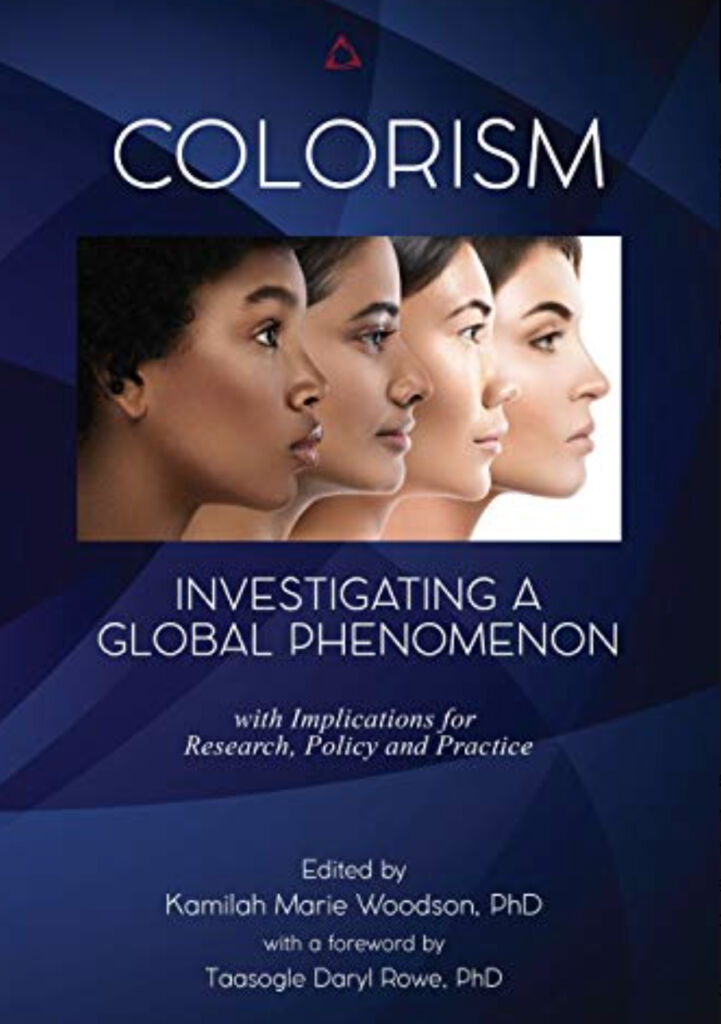Colorism: Investigating a Global Phenomenon
Edited by Howard University’s Dr. Kamilah Marie Woodson
Now available in both printed and e-book format
“Dr. Kamilah Woodson and colleagues have produced a global compendium of answers to these questions of colorism. We who perpetuate this crippling malady must use this volume’s explanatory force to change the world it describes.” Gregory Carr, Ph.D., African American Studies Chairman, Howard University
“No course instructor should dare to teach his/her race related class without using this essential compilation as it has been far too long for scholars and educators to not have this extraordinary and provocative narrative on colorism.” James C. Wadley, Ph.D., Editor in Chief of the Journal of Black Sexuality and Relationships
In an age of growing racial tensions, police brutality, and the “Black Lives Matter” movement, Colorism: Investigating a Global Phenomenon is a powerful contribution that examines the roots of colorism in modern society, not only in North America but around the world. It provides penetrating insights into the historical, social, cultural, and personal challenges of people of color—including those of either African, Latino and Indian/Asian ancestry. While colorism has traditionally been defined in terms of prejudice or discrimination relative to skin color, this 400-page reference work argues that colorism differs from racism in that it is multifaceted: it can be observed between different social groups as well as within one’s own ethnic group. it is. As such, the main objective of this volume is to provide a comprehensive reference on the history, scope, trends, and implications of colorism. This includes topics such as
- the acknowledgment of the continuing role of the European aesthetic, such as hair texture/length, body image, and perceived attractiveness;
- a recognition that colorism not only impacts Africans in America but people of color around the world; and
- an understanding of colorism as a developmental phenomenon that takes root in family dynamics and spreads throughout society.
In that sense, colorism is a far more complex and pervasive global phenomenon than was previously posited, not only for its toxic corollaries, but also for its impact on self-esteem and core sense of self.
“Colorism” is the outflow of an ambitious, multi-year effort led by Dr. Kamilah Woodson involving a cadre of 45 scholars from Howard University, Fielding Graduate University, Texas Southern University, Virginia Commonwealth University, Grambling State University, The University of North Texas, The Chicago School of Professional Psychology, Winston-Salem University, Morgan State University, Louisiana State University, the University of the District of Columbia, and other leading institutions.
To purchase a printed version of Colorism: Investigating a Global Phenomenon, please click:
To purchase an ebook version of Colorism: Investigating a Global Phenomenon, please click:
Fielding Monograph Series (Book 15)
Paperback: 405 pages
Publisher: Fielding University Press (September 30, 2020)
ISBN-10 : 1647130190
ISBN-13 : 978-1647130190
Praise for Colorism: Investigating a Global Phenomenon:
“Dr. Kamilah Woodson has taken on the impressive task of deconstructing the colorism component of the “racist racial race paradigm.” In this collection, she has brought together an assemblage of contemporary warrior scholars who are engaged in intellectual warfare to dismantle the war machine of injustice, human degradation and deprivation concealed under the guise of pseudo-scientific justification.”
–Na’im Akbar, Ph.D., Past President of The Association of Black Psychologists-(Retired) Clinical Psychologist from Florida State University
“While much has been written and studied about the various -isms (racism, sexism, ageism, etc.) that divide humanity in the United States and elsewhere, relatively little attention has focused on the insidious topic of colorism both within and across groups. In general, darkness in skin color vs. lightness (whiteness) is almost universally associated – even in language – with such dichotomous constructs as bad/good, evil/purity, ugly/pretty and the like. This important volume documents the pervasiveness of colorism in society and implicitly seeks to mitigate its divisive presence.”
-Orlando L. Taylor, Ph.D., Distinguished Senior Advisor to the President, Fielding University; Professor and Dean Emeritus, Howard University

